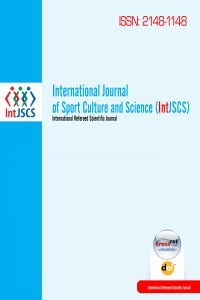A Study Regarding the Level of Performance Specific to Backstroke Swimming with Students at Physical Education and Sport
backstroke, technique, floating methodology, students,
___
- Badau A (2016). Aquagym theory and methodology, Publisher by University Press, Tirgu Mures.
- Badau A, Ungur NR, Badau D (2016). Activitățile fizice acvatice indoor, Ed. Universitatii Transilvania, Brasov, ISBN: 978-606-19-0783-0
- Badau D (2006). Ambidextria in activitatea motrica, Ed. Universitatii Transilvania din Brasov Enoiu R (2015). Bazele generale ale antrenamentului sportiv. Generalitati. Ed. Universitatii Transilvania, Brasov.
- Grosu, EF (2012). Technics of mental training. (3rd edition), Cluj-Napoca: GMI Press. ISBN 978-973- 1776-41-5.
- Herzog W (2012). Sport and health are global issues, J Sport Health Sci, (1):4
- João Bartholomeu Neto et all (2016). Response of Critical Speed to Different Macrocycle Phases during Linear Periodization on Young Swimmers, International Journal of Science Culture and Sport, 4(1): 23-30, Doi : 10.14486/IntJSCS471
- Mandzák P, Stankiewicz B (2014). Correction of errors front crawl swimming technique of students of physical education and sport, 2014, Journal of Health Sciences. 4(14):27-38, DOI: 10.5281/zenodo.13262
- Morais JE, Silva AJ, Marinho DA, Seifert L, Barbosa TM (2015). Cluster Stability as a New Method to Assess Changes in Performance and its Determinant Factors Over a Season in Young Swimmers. International Journal of Sports Physiology and Performance, (10):261-268
- Statkevičienė B, Venckūnas T (2008). Athletes’ anthropometrical measurements and physical capacity influence on learning competitive swimming techniques, Acta Medica Lituanica, 15(4): 229-234
- Toskić D, Lilić L, Milenković V, Toskić L (2014). Comparative analysis of different curricula on students’ swimming techniquesac quisition, Research in kinesiology, 42(2):196-199 Turkmen M (2013). The relationships between gender, physical self-perception, sport experience, motivation orientations and academic success, International Journal of Academic Research, 5(5): 66-72. DOI: 10.7813/2075-4124.2013/5-5/B.10.
- Turkmen M, Ozkan A, Kul M, Bozkus T (2015). Investigation of the relationship between physical activity level and healthy life-style behaviors of academic staff. Educational Research and Reviews. 10(5):577-581, DOI: 10.5897/ERR2015.2083
- Wiesner W (2008). Swimming Education – the Area of Interest and Methodological Basis, Science In Swimming II, 41–48
- ISSN: 2148-1148
- Başlangıç: 2013
- Yayıncı: Uluslararası Bilim Kültür ve Spor Derneği (UBİKS)
Raci KARAYIGIT, Burak Caglar YASLI, Hakan KARABIYIK, Goktug ERTETIK, Mitat KOZ, Gulfem ERSOZ
Ahmet GÖNENER, Ozan YILMAZ, Utku GÖNENER, Zafer DAMA
